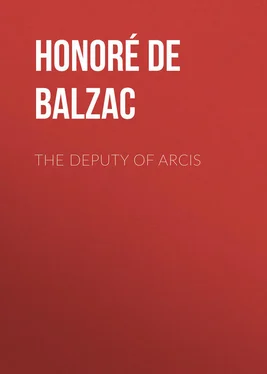Honoré Balzac - The Deputy of Arcis
Здесь есть возможность читать онлайн «Honoré Balzac - The Deputy of Arcis» — ознакомительный отрывок электронной книги совершенно бесплатно, а после прочтения отрывка купить полную версию. В некоторых случаях можно слушать аудио, скачать через торрент в формате fb2 и присутствует краткое содержание. Жанр: literature_19, foreign_antique, foreign_prose, на английском языке. Описание произведения, (предисловие) а так же отзывы посетителей доступны на портале библиотеки ЛибКат.
- Название:The Deputy of Arcis
- Автор:
- Жанр:
- Год:неизвестен
- ISBN:нет данных
- Рейтинг книги:3 / 5. Голосов: 1
-
Избранное:Добавить в избранное
- Отзывы:
-
Ваша оценка:
- 60
- 1
- 2
- 3
- 4
- 5
The Deputy of Arcis: краткое содержание, описание и аннотация
Предлагаем к чтению аннотацию, описание, краткое содержание или предисловие (зависит от того, что написал сам автор книги «The Deputy of Arcis»). Если вы не нашли необходимую информацию о книге — напишите в комментариях, мы постараемся отыскать её.
The Deputy of Arcis — читать онлайн ознакомительный отрывок
Ниже представлен текст книги, разбитый по страницам. Система сохранения места последней прочитанной страницы, позволяет с удобством читать онлайн бесплатно книгу «The Deputy of Arcis», без необходимости каждый раз заново искать на чём Вы остановились. Поставьте закладку, и сможете в любой момент перейти на страницу, на которой закончили чтение.
Интервал:
Закладка:
“If I succeed in managing the election of Arcis according to the wishes of those who have sent me here, you, my dear friend, will be made a prefect. Here, read these”; and he held out two letters to his visitor.
“Very good, Monsieur le comte,” said Antonin, returning them.
“Make a list of all the votes on which the ministry may count. Above all, let no one suspect that you and I understand each other. I am a speculator in land, and I don’t care a fig for elections.”
“I will send the commissary of police to force you to inscribe your name on Poupart’s register.”
“So do. Adieu, monsieur. Heavens! what a region this is,” said the count, in a loud voice; “one can’t take a step without having the community, sub-prefect and all, on one’s back.”
“You will have to answer to the commissary of police, monsieur,” said Antonin, in an equally loud tone.
And for the next twenty minutes Madame Mollot talked of the altercation that took place between the sub-prefect and the stranger.
“Well, what wood is the beam that has plumped into our bog made of?” said Olivier Vinet when Antonin Goulard rejoined them on leaving the Mulet.
“He is a Comte Maxime who is here to study the geological system of Champagne, with a view to finding mineral waters,” replied the sub-prefect, with an easy manner.
“Say a speculator,” said Oliver.
“Does he expect to get the natives to lay out capital?” asked Monsieur Martener.
“I doubt if our royalists will go into that kind of mining,” remarked Vinet, laughing.
“What should you think from the air and gestures of Madame Marion?” said the sub-prefect turning off the subject by pointing to Madame Marion and Simon, who were deep in conversation.
Simon had gone toward the bridge to meet his aunt, and was now walking with her up the square.
“If he was accepted one word would suffice,” said the shrewd Olivier.
“Well?” said all the officials when Simon came to them under the lindens.
“My aunt thinks the matter very hopeful,” replied Simon. “Madame Beauvisage and old Grevin, who has just gone to Gondreville, were not at all surprised at my proposals; they talked of our respective fortunes, and said they wished to leave Cecile perfectly free to make her choice. Besides which, Madame Beauvisage said that, as for herself, she saw no objection to an alliance by which she should feel herself honored; although she postponed all answer until after my election, and possibly my first appearance in the Chamber. Old Grevin said he should consult the Comte de Gondreville, without whose advice he never took any important step.”
“All of which means,” said Goulard, point-blank, “that you will never marry Cecile, my old fellow.”
“Why not?” said Giguet, ironically.
“My dear friend, Madame Beauvisage and her daughter spend four evenings every week in the salon of your aunt; your aunt is the most distinguished woman in Arcis; and she is, though twenty years the elder, an object of envy to Madame Beauvisage; don’t you see, therefore, that they wished to wrap up their refusal in certain civilities?”
“Not to say entire yes or no in such cases,” said Vinet, “is to say no , with due regard to the intimacy of the two families. Though Madame Beauvisage has the largest fortune in Arcis, Madame Marion is the most esteemed woman in the place; for, with the exception of our chief-justice’s wife, who sees no one now, she is the only woman who knows how to hold a salon; she is the queen of Arcis. Madame Beauvisage has tried to make her refusal polite, that’s all.”
“I think that old Grevin was fooling your mother,” said Frederic Marest.
“Yesterday you attacked the Comte de Gondreville, you insulted and grievously affronted him, and he is to be consulted about your marriage to Cecile!”
“Pere Grevin is a sly old dog,” said Vinet.
“Madame Beauvisage is very ambitious,” pursued Antonin Goulard. “She knows very well her daughter is to have two millions; she means to be mother-in-law of a minister, or an ambassador, in order to play the great lady in Paris.”
“Well, why not?” said Simon Giguet.
“I wish you may get it!” replied the sub-prefect looking at Vinet, with whom he went off into a hearty laugh as soon as they were out of hearing. “He won’t even be deputy,” added Antonin, addressing Vinet; “the ministry have other views. You will find a letter from your father when you get home, enjoining you to make sure of the votes of all the persons in your department, and see that they go for the ministerial candidate. Your own promotion depends on this; and he requests you to be very discreet.”
“But who is the candidate for whom our ushers and sheriffs and clerks, and solicitors and notaries are to vote?” asked Vinet.
“The one I shall name to you.”
“How do you know my father has written to me, and what he wrote?”
“The stranger told me – ”
“The man after water?”
“My dear Vinet, you and I are not to know; we must treat him as a stranger. He saw your father at Provins as he came through. Just now this same man gave me a note from the prefect instructing me to follow in every particular the instructions of Comte Maxime about this election. I knew very well I should have a battle to fight! Come and dine somewhere and we will get out our batteries. You are to be procureur-du-roi at Mantes, and I am to be prefect; but we must seem to have nothing to do with the election, for don’t you see, we are between the hammer and the anvil. Simon is the candidate of a party which wants to overturn the present ministry and may succeed; but for men as intelligent as you and I there is but one course to take.”
“What is that?”
“To serve those who make and unmake ministers. A letter was shown to me from one of those personages who represent the stable and immovable thought of the State.”
Before going farther, it is necessary to explain who this Unknown person was, and what his purpose was in coming to Champagne.
XII. THE SALON OF MADAME D’ESPARD
About two months before the nomination of Simon Giguet, at eleven o’clock one evening, in a mansion of the faubourg Saint-Honore belonging to the Marquise d’Espard, while tea was being served the Chevalier d’Espard, brother-in-law to the marquise, put down his tea-cup, and, looking round the circle, remarked: —
“Maxime was very melancholy to-night, – didn’t you think so?”
“Yes,” replied Rastignac, “but his sadness is easily accounted for. He is forty-eight years old; at that age a man makes no new friends, and now that we have buried de Marsay, Maxime has lost the only man capable of understanding him, of being useful to him, and of using him.”
“He probably has pressing debts. Couldn’t you put him in the way of paying them?” said the marquise to Rastignac.
At this period Rastignac was, for the second time, in the ministry; he had just been made count almost against his will. His father-in-law, the Baron de Nucingen, was peer of France, his younger brother a bishop, the Comte de Roche-Hugon, his brother-in-law, was an ambassador, and he himself was thought to be indispensable in all future combinations of the ministry.
“You always forget, my dear marquise,” replied Rastignac, “that our government exchanges its silver for gold only; it pays no heed to men.”
“Is Maxime a man who would blow out his brains?” inquired the banker du Tillet.
“Ha! you wish I were; we should be quits then,” said Comte Maxime de Trailles, whom everybody supposed to have left the house.
The count rose suddenly, like an apparition, from the depths of an arm-chair placed exactly behind that of the Chevalier d’Espard.
Читать дальшеИнтервал:
Закладка:
Похожие книги на «The Deputy of Arcis»
Представляем Вашему вниманию похожие книги на «The Deputy of Arcis» списком для выбора. Мы отобрали схожую по названию и смыслу литературу в надежде предоставить читателям больше вариантов отыскать новые, интересные, ещё непрочитанные произведения.
Обсуждение, отзывы о книге «The Deputy of Arcis» и просто собственные мнения читателей. Оставьте ваши комментарии, напишите, что Вы думаете о произведении, его смысле или главных героях. Укажите что конкретно понравилось, а что нет, и почему Вы так считаете.












